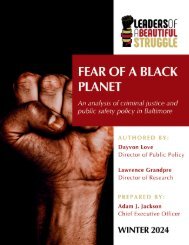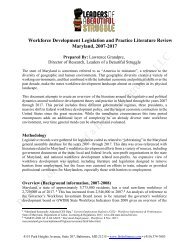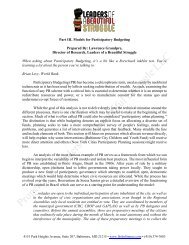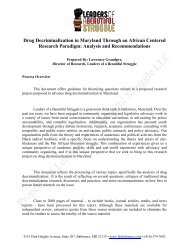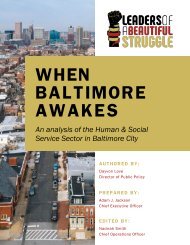The Communal Impacts of Drug Criminalization in Maryland
This project attempts to reframe the harms of drug criminalization. Influenced by African-Centered Research Methodologies, we engaged in a literature review and qualitative research of the communal impacts of drug decriminalization in Maryland, with a specific focus on Baltimore.
This project attempts to reframe the harms of drug criminalization. Influenced by African-Centered Research Methodologies, we engaged in a literature review and qualitative research of the communal impacts of drug decriminalization in Maryland, with a specific focus on Baltimore.
You also want an ePaper? Increase the reach of your titles
YUMPU automatically turns print PDFs into web optimized ePapers that Google loves.
<strong>The</strong> <strong>Communal</strong> <strong>Impacts</strong> <strong>of</strong> <strong>Drug</strong> <strong>Crim<strong>in</strong>alization</strong> <strong>in</strong> <strong>Maryland</strong><br />
Introduction<br />
As a new wave <strong>of</strong> drug policy reform <strong>in</strong> the U.S. reconsiders crim<strong>in</strong>al legal approaches, we must exam<strong>in</strong>e<br />
these policies <strong>in</strong> the context <strong>of</strong> racialized structural oppression to address and repair the societal harms<br />
experienced disproportionately by African-American communities. To understand the harms <strong>of</strong> drug<br />
crim<strong>in</strong>alization <strong>in</strong> this context, a partnership was forged with the support <strong>of</strong> the Open Society<br />
Foundations between a Baltimore-based, community-based scholar and a team <strong>of</strong> university-based<br />
researchers <strong>in</strong> the fields <strong>of</strong> social work, crim<strong>in</strong>ology, and public health. <strong>The</strong> research team was asked to<br />
research the harms <strong>of</strong> drug crim<strong>in</strong>alization to make a case for decrim<strong>in</strong>aliz<strong>in</strong>g the personal use <strong>of</strong> drugs.<br />
Through consultation with the community-based scholars, the team agreed to go beyond an analysis <strong>of</strong><br />
the harms <strong>of</strong> crim<strong>in</strong>alization that focuses on <strong>in</strong>dividual <strong>in</strong>stances <strong>of</strong> arrests and <strong>in</strong>carceration and "waste"<br />
<strong>of</strong> f<strong>in</strong>ancial resources.<br />
A research process was created to reframe the harms <strong>of</strong> crim<strong>in</strong>alization around the community impacts <strong>of</strong><br />
racialized hyper-<strong>in</strong>carceration targeted at specific communities, with a focus on refram<strong>in</strong>g<br />
decrim<strong>in</strong>alization as a mechanism to restore the civil communal fabric impacted by the War on <strong>Drug</strong>s.<br />
<strong>The</strong> community-based scholar used African-Centered research paradigms, <strong>in</strong>clusive <strong>of</strong> various research<br />
methodologies guided by the culture and experiences <strong>of</strong> people <strong>of</strong> African descent. African-Centered<br />
research paradigms challenge us to account for the community-wide implications <strong>of</strong> drug crim<strong>in</strong>alization<br />
and towards reparations when th<strong>in</strong>k<strong>in</strong>g about decrim<strong>in</strong>alization strategies. To shift power to communities<br />
seek<strong>in</strong>g self-determ<strong>in</strong>ation and liberation from the structural oppression <strong>of</strong> drug crim<strong>in</strong>alization, the<br />
research team applied a participatory action research (also known as PAR) approach. PAR merges social<br />
change activities with knowledge <strong>in</strong>quiry guided by those most impacted by the research. Shift<strong>in</strong>g<br />
<strong>in</strong>tellectual guidance away from academic <strong>in</strong>stitutions that conventionally hold power over solutions, the<br />
community-based scholar drove the research framework that <strong>in</strong>formed the objectives, structure,<br />
methodologies, and content <strong>of</strong> the report.<br />
<strong>The</strong> first objective <strong>of</strong> this report was to conduct a precise analysis <strong>of</strong> community disruption via the<br />
systems <strong>of</strong> drug crim<strong>in</strong>alization to <strong>in</strong>form the second objective <strong>of</strong> highlight<strong>in</strong>g drug policy focus areas for<br />
solutions and repair <strong>of</strong> the community harms. <strong>The</strong> team first conducted a scop<strong>in</strong>g review <strong>of</strong> academic<br />
literature <strong>in</strong> the U.S. to critically assess the role <strong>of</strong> drug crim<strong>in</strong>alization on the social conditions <strong>of</strong><br />
communities most <strong>of</strong>ten targeted by drug prohibition efforts. We found that exist<strong>in</strong>g academic literature<br />
frames the harms <strong>of</strong> drug crim<strong>in</strong>alization on disrupt<strong>in</strong>g social capital <strong>of</strong> the communal <strong>in</strong>stitution <strong>of</strong><br />
families. It also emphasized the need to strengthen access to exist<strong>in</strong>g external systems <strong>of</strong> support, like<br />
drug treatment and job placements spatially and culturally outside <strong>of</strong> communities. <strong>The</strong>re is little research<br />
on how crim<strong>in</strong>alization impacts <strong>in</strong>dividuals' ability to access or engage <strong>in</strong>digenous community<br />
<strong>in</strong>stitutions. <strong>The</strong> paucity <strong>of</strong> research sheds light on the need to center knowledge production on collective<br />
harms <strong>of</strong> drug crim<strong>in</strong>alization. Research <strong>in</strong>form<strong>in</strong>g drug policy is miss<strong>in</strong>g critical perspectives and rarely<br />
<strong>in</strong>cludes perspectives from impacted communities, lead<strong>in</strong>g us to conduct qualitative <strong>in</strong>terviews with<br />
community leaders <strong>in</strong> Baltimore.<br />
<strong>The</strong> research team <strong>in</strong>terviewed 12 Baltimore region-based key experts who identified as community<br />
organizers, youth mentors, grassroots or academic educators, mental health and social work<br />
pr<strong>of</strong>essionals, harm reduction organizers, and holistic addiction providers. All <strong>in</strong>terviewees provided firsthand<br />
knowledge and experiences <strong>of</strong> structural and historical realities <strong>of</strong> drug use, crim<strong>in</strong>alization, and the<br />
drug treatment <strong>in</strong>frastructure <strong>in</strong> Baltimore. <strong>The</strong>y also <strong>of</strong>fered visions <strong>of</strong> a world without drug<br />
crim<strong>in</strong>alization and recommendations for state and local policies. F<strong>in</strong>d<strong>in</strong>gs demonstrate the importance<br />
<strong>of</strong> collective well-be<strong>in</strong>g <strong>in</strong> address<strong>in</strong>g substance use disorders (SUDs) and undergird the case for<br />
reparations that allow communities most impacted by the War on <strong>Drug</strong>s to rebuild, heal, and thrive while<br />
hav<strong>in</strong>g local control over alternatives to crim<strong>in</strong>alization.<br />
This report outl<strong>in</strong>es community harm rooted <strong>in</strong> the racialized structural violence <strong>of</strong> drug crim<strong>in</strong>alization<br />
<strong>in</strong> <strong>Maryland</strong> with a focus on Baltimore City to provide advocates with tools to <strong>in</strong>form their efforts <strong>in</strong><br />
advanc<strong>in</strong>g policy change <strong>in</strong> the state. It is our hope that this analysis will prompt policy advocates <strong>in</strong> and<br />
out <strong>of</strong> <strong>Maryland</strong> to question and challenge assumptions regard<strong>in</strong>g drug policy solutions. Understand<strong>in</strong>g<br />
14 <strong>of</strong> 55




